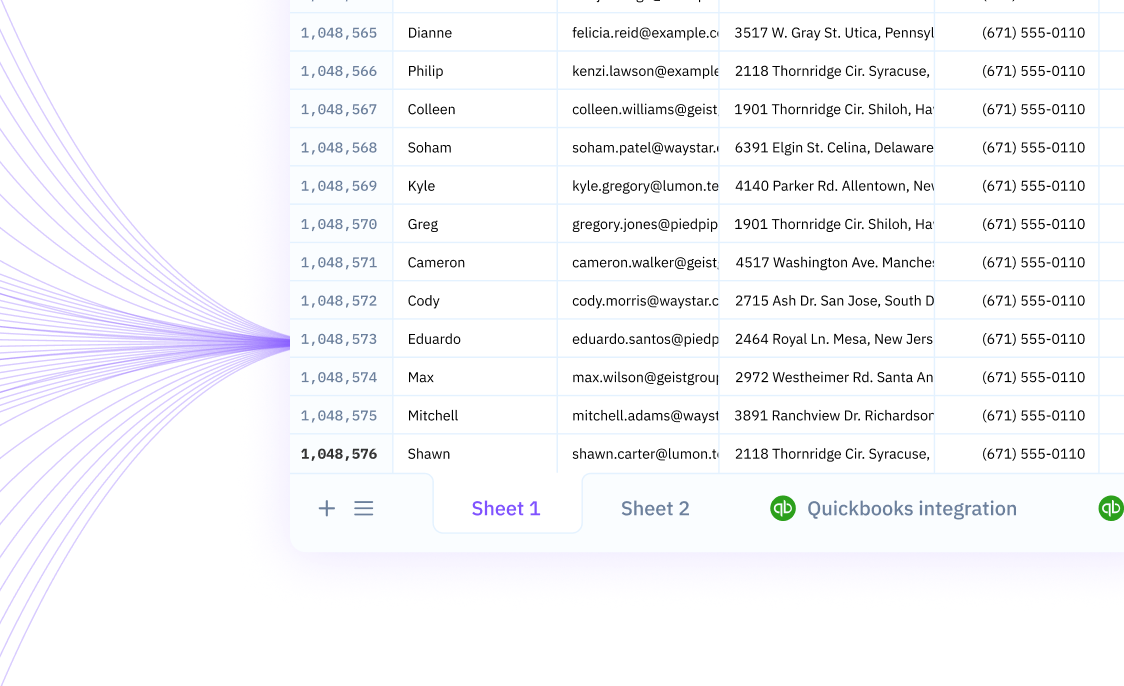
Export Chrome bookmarks to CSV

Overview
Welcome to your comprehensive guide on exporting Chrome bookmarks to a CSV file, a valuable practice for enhancing data portability and ensuring access to your bookmarks in various scenarios. By converting Chrome bookmarks to a CSV format, users can leverage the power of spreadsheet tools to organize, search, and manage their data more effectively. On this page, we'll explore what Chrome bookmarks are, guide you through the process of exporting Chrome bookmarks to a CSV file, discuss the use cases for such exports, introduce Sourcetable as an alternative to traditional CSV exports for Chrome bookmarks, and answer frequently asked questions about the entire process. Stay tuned to unlock the potential of your bookmarks in ways you never imagined!
What Are Chrome Bookmarks?
Chrome bookmarks are a web browser feature that enables users to save and manage the URLs of their favorite and frequently visited websites. This functionality saves time and enhances efficiency by allowing quick access to web pages, especially those with lengthy URLs or specific sections of a site that users wish to return to regularly.
These bookmarks can be easily accessed across multiple devices by signing into Chrome with a Google Account, ensuring that users have their bookmarks available wherever they go. Bookmarks in Chrome can be created, sorted, moved, and deleted, providing a high level of organization and customization. Additionally, bookmarks can be edited for precision and searched for ease of access through the bookmarks manager or directly from the address bar using the "@bookmarks" command.
Exporting Chrome Bookmarks to a CSV File
Using an Extension to Export Bookmarks
To save your Chrome bookmarks in a CSV format, you can use the Export History/Bookmarks to JSON/CSV*/XLS* extension. This tool is designed to export your bookmarks into a JSON file. Once you have the JSON file, the next step is to convert it into a CSV format.
Converting JSON to CSV
After using the extension to export your bookmarks, visit www.json-xls.com/json2xls to convert the JSON file into a CSV file. This website enables the conversion of a JSON file to various formats including CSV, XLS, and XLSX.
Import Chrome Bookmarks Directly into Sourcetable
Switching to Sourcetable for managing your Chrome bookmarks can streamline your workflows and enhance your data management experience. Unlike the traditional method of exporting your bookmarks to a CSV file and then importing them into another spreadsheet program, Sourcetable allows you to seamlessly sync your live data from Chrome. This direct integration not only saves time but also reduces the chances of errors that may occur during the export-import process.
With Sourcetable, you benefit from automation capabilities that are not available when manually handling CSV files. This means once you set up the initial sync, your bookmarks will continuously update in real-time within Sourcetable, providing you with up-to-date information at all times. Moreover, Sourcetable's intuitive spreadsheet interface makes querying and organizing your bookmarks straightforward, which is especially useful for business intelligence tasks where quick access to your data is essential.
Furthermore, by using Sourcetable, you eliminate the need to juggle between multiple programs to manage your data. This centralized approach not only enhances efficiency but also provides a more robust platform for data analysis and decision-making. Sourcetable's advanced capabilities offer a significant edge over traditional spreadsheet programs, making it an excellent choice for anyone looking to optimize their bookmark management and data analysis workflows.
Common Use Cases
-
Use case 1: Organizing and managing bookmarks in spreadsheet software for easier editing and categorizationC
-
Use case 2: Sharing a list of bookmarks with colleagues in a universally acceptable format like CSVC
-
Use case 3: Importing bookmarks into other applications that require CSV inputC
-
Use case 4: Creating a backup of bookmarks that can be easily read and processed by various toolsC
-
Use case 5: Analyzing bookmark data using data analysis tools that accept CSV filesC
Frequently Asked Questions
How can I export my Chrome bookmarks to a CSV file?
First, use the Chrome extension to export your bookmarks to a JSON file. Then, convert the JSON file to a CSV format using an online converter like http://www.json-xls.com/.
Can I export my Chrome bookmarks directly to Microsoft Excel or CSV?
No, the extension does not support direct export to Microsoft Excel Binary File Format or CSV. You must first export to JSON and then convert the file.
Will the extension work if I'm not connected to the internet?
No, the extension is not available for offline use.
Is there a limit to how many history records I can export with the extension?
Yes, the extension limits the number of history records you can export.
Can I use the extension with older versions of Chrome like v65.0.3325.181?
The extension may not work with Chrome v65.0.3325.181 or later versions.
Conclusion
In conclusion, exporting your Chrome bookmarks is a straightforward process that can be accomplished in just a few steps. Whether you're transferring your bookmarks to another computer or organizing them for your convenience, the process begins by using the built-in export feature in Chrome's Bookmark Manager to save your bookmarks as an HTML file. If you require a CSV file, you can use the "Export History/Bookmarks to JSON/CSV*/XLS*" extension created by the owner of json-xls.com to export your bookmarks to a JSON file and then convert it to a CSV format through http://www.json-xls.com. However, if you're looking to streamline the process even further, consider using Sourcetable, which allows you to import data directly into a spreadsheet, bypassing the need for intermediate file conversions. Sign up for Sourcetable to get started and enhance your data management experience.


